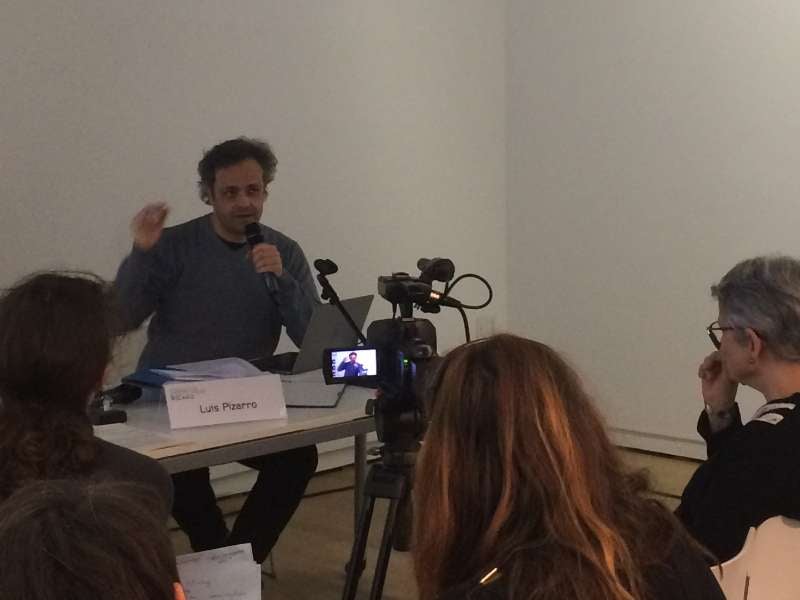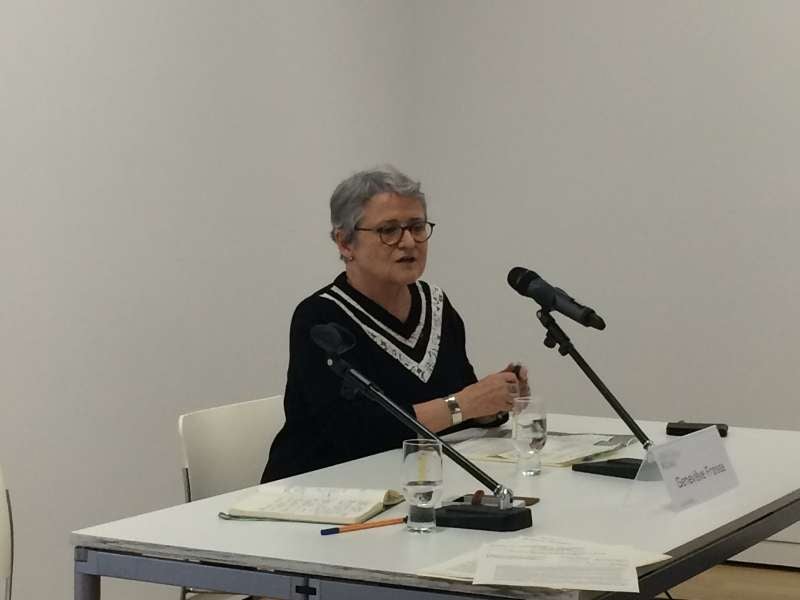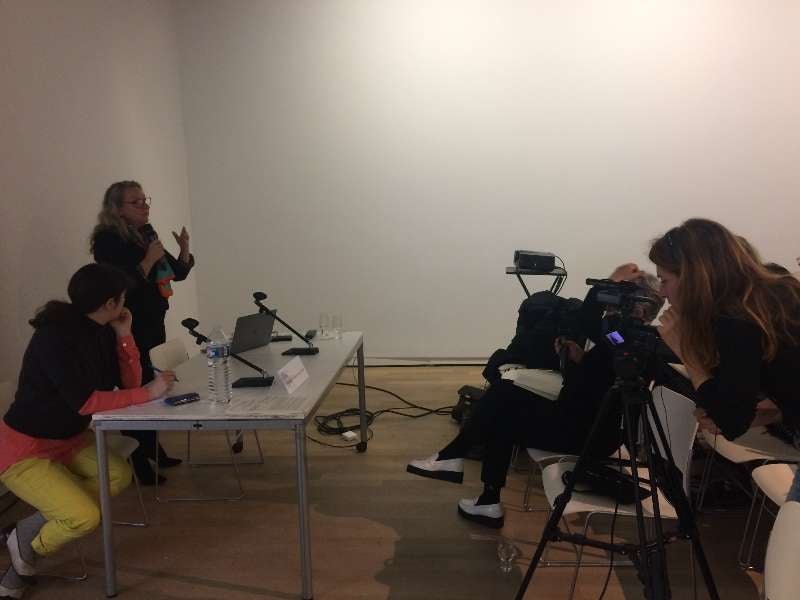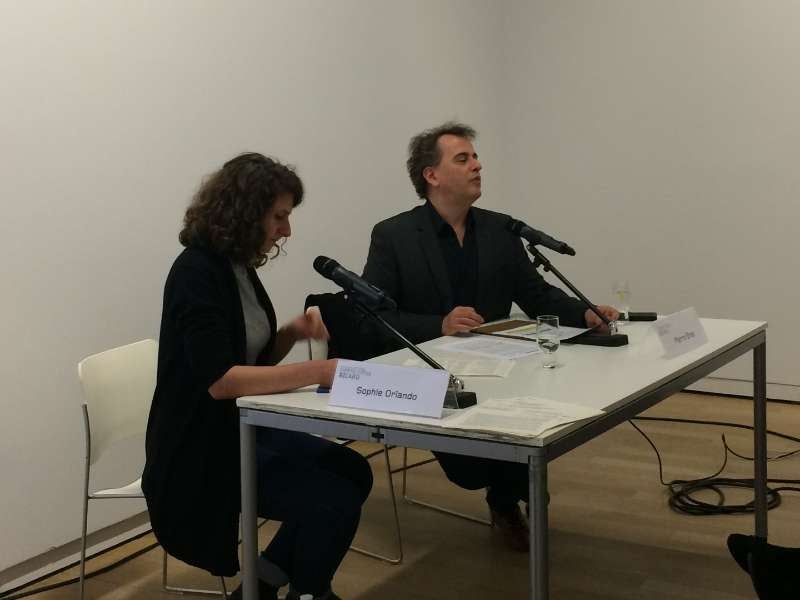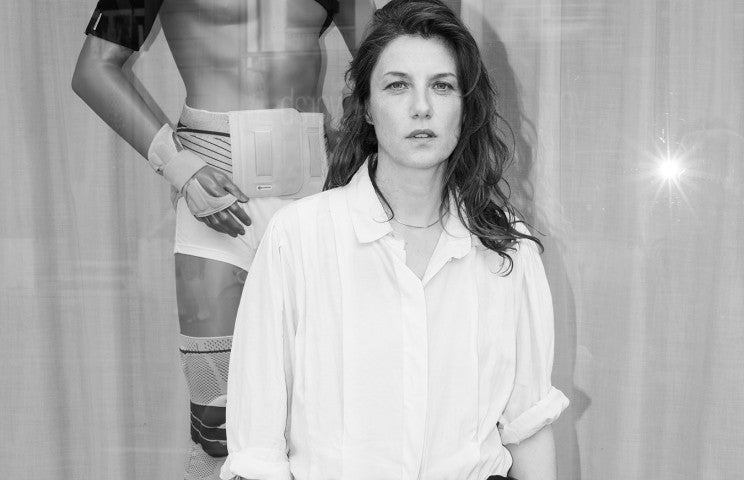Study day Habiter la contradiction
Designed by Les Vagues collective
The work group Les Vagues is a feminist collective. Composed of visual arts professionals, the collective meets to think about and implement articulations between art, history of art, political culture and activism from an assertive viewpoint. The collective inventories, and spreads awareness about tools of positive change, and affirms feminist and egalitarian professional practices, with a close attention to social justice. Practicing an intersectional feminist epistemology in the art world means getting formats, discourses, social sciences tools (history of art, political sciences, philosophy, cultural studies) of activism (decolonial, LGBTQI+, queer, black feminism/afrofeminism) working with and within the processes and modalities of art.
The seminar:
Geneviève Fraisse, Emeritus Research Director at the CNRS (Centre National de Recherche Scientifique) has produced a philosophical body of work stemming from historical material. She has brought new feminist genealogies to light and engaged in dialogues with either isolated or well-recognised works, from Poullain de la Barre to Simone de Beauvoir and Germaine de Staël. She argues that the French Revolution, born from universalism, was paradoxically both the starting point of the conceptualization of women’s place in public matters, and of their exclusion from the political field — what Fraisse calls « exclusive democracy ».
For several years now, Fraisse’s thought has spread out of the academic world. It is the sign of a new French-speaking perspective on gender studies, while the past two decades years have been marked by North American models.
An intellectual and an activist, Geneviève Fraisse has been an important figure in the Women’s Liberation Movement (Mouvement de Libération des Femmes). She also was an inter-ministerial delegate on women’s rights (1997-1998) and a Member of the European Parliament (1999-2004). As a researcher, a woman and an activist, she has developed a radical mode of thinking that is being reactivated by today’s political questionings.
The study days Inhabiting contradiction: uses and transmission (« peddling philosophy ») of Geneviève Fraisse’s thought will be the opportunity to examine philosophical contributions to gender studies in France, assert the reappropriation of public debate as an emancipatory practice, starting from non-dogmatic logics as well as demanding that concepts be questioned over and over.
The program:
Peddling/ historicity/ setbacks in feminism
Thursday, March 29, at Fondation d’entreprise Ricard
Morning: moderated by Les Vagues – Louise Hervé
9:30 am – 10 am: Arrival of the participants
10 am – 10:15 am: Introduction by Les Vagues – Isabelle Alfonsi
10:15 am – 11:15 am: Véronique Lefebvre des Noettes, « Du consentement au prisme de la maladie d’Alzheimer ».
Consent to care, upon entering an institution, seems like a strong, clear, transparent, contractual notion that is a major principle repeatedly affirmed in legislation, from the Nuremberg Code in 1947 to the 2015 French law on adapting society to an ageing population. Consenting means committing to a voluntary, reasoned, fully conscious decision taken after a period of deliberation. But when vulnerability sets in, when dementia “muddles” things, what should be done? Geneviève Fraisse’s works will enlighten our clinic since she has shown that “Consent seems like a simple word, a transparent notion, a nice abstraction of human will; yet it is thick and obscure like the shadow and flesh of every unique individual.”
11:15 am – 12:15 am: Luis Pizarro, « Woman and Family in the Construction of Liberal Citizenship. Spain, 1834-1846 ».
Luis Pizarro Carrasco presents some of his research on the feminist demands made during the so-called “liberal feminism” period in Spain (1834-1846): women writers, women closely linked to a progressive feminism, the first democrats, and demands by Spanish Fourierist feminists. He analyses the rejection of women’s right to vote in liberalism, or as Geneviève Fraisse points out: the reasons for its total lack of formulation. He will shed light on a female “political construction” undetected in Spanish historiography.
Afternoon: moderated by Les Vagues – Sophie Orlando
2 pm – 3 pm: Lalla Kowska Régnier, « Incarner la contradiction, échapper à la sidération ».
3 pm – 4 pm: Emilie Noteris, « « ISMES » NO GOOD : Devenir féministes à la place des féministes ».
A small cinematic, serial enquiry into the appropriation of feminist discourse for reactionary or nationalist purposes, and the liberal hijacking of women’s struggles, emptying feminism’s theoretical advances of all intersectional and political significance.
4 pm – 4:30 pm: break
4:30 pm – 5:30 pm: Pierre Bras, « Geneviève Fraisse, philosophe populaire ».
In his contribution, Pierre Bras shows how Geneviève Fraisse (author of Le Privilège de Simone de Beauvoir), who is a member of the institution, escapes from institutional thought and, in his view, gets heard outside the university, that is to say she “[…] reaches a transgenerational popular audience that is receptive to the revitalization of concepts through reality. »
5:30 pm – 6 pm: conclusion by Geneviève Fraisse
Lineages and emancipation
Friday, March 30, at Centre d’Etudes du Vivant, Université Paris Diderot, Turing Amphitheatre, Sophie Germain Building, Place Aurélie Nemours – 75013 Paris (level -2, accessed via the entrance on the left)
Morning: moderated by Les Vagues – Chloé Maillet 9:30 am – 10 am: Arrival of the participants 10 am – 11 am: Diletta Mansella, « La figure de Béatrice Cenci chez P.B. Shelley, Stendhal et Alexandre Dumas : le privilège d’un sujet ». We will explore the literary construction of the figure Béatrice Cenci, who was the victim of sexual violence and the subject of an incredible revolt. Percy Bysshe Shelley, Stendhal and Alexandre Dumas all wrote about this figure around the same period. This coincidence will be interpreted in light of the concepts of privilege and of difference between the sexes, which are at work in the writings of Geneviève Fraisse. 11 am – 12 am: Joëlle Palmieri, « Des Pénélopes à la généalogie du concept de colonialité numérique ». Les Pénélopes is an international feminist publishing experiment, which stems from Geneviève Fraisse’s thought in the sense that it is the product of a genealogy linked to the history of dominations. Afternoon: moderated by Les Vagues – Isabelle Alfonsi 2 pm – 3 pm: Geneviève Fraisse, « La suite de l’histoire ». 3 pm – 3:30 pm: break 3:30 pm – 5 pm: Discussion: built art feminist lines and think emancipation with Renaud Chantraine, Elisabeth Lebovici, Reine Prat, Emilie Renard and Virginie Jourdain.5 pm – 5:30 pm: conclusion by Les Vagues – Géraldine Gourbe
The participants in these two study days
Pierre Bras is director of the magazine L’Homme et la Société. He teaches French studies at the University of California (Santa Barbara and Paris) and is a member of the jury for the Simone de Beauvoir Prize for women’s freedom. He recently published a collective book entitled Corps sexué, corps genré : une géopolitique. Pierre Bras works on the links between law, economics and literature, and in 2016 he edited a book entitled Economie et littérature.
Renaud Chantraine is a PhD student at the EHESS in Paris. His research concerns the transmission of traces of sexual minorities in France, the Netherlands and Germany. He is working at the Mucem in Marseille in the context of a project to promote heritage related to the struggle against AIDS.
Virginie Jourdain is an artist, independent curator and cultural worker at La Centrale galerie Powerhouse (Montreal, CA). Through her artistic approach and research, she attempts to question the authority of hierarchy, gender, practices and narratives in art.
Lalla Kowska Régnier was an activist in the fight against AIDS in the early 1990s. She then worked with industrial entertainment companies until the early 2000s. After her dismissal from Canal +, she began a transition. For around ten years, far from the realms of academia and activism, she has been occasionally writing on political, social and artistic themes that cross her transgendered, deracialized body. With Jihan Ferjani she co-wrote the Manifeste Trans’ : Notre corps nous appartient, in “Nouvelles questions féministes”, 2008. She contributes to the magazine “Terrain vague”. She manages the bar La Moderne on rue de Beaubourg in Paris.
Elisabeth Lebovici is an art historian and critic. Since 2006 she has been a co-organizer of the seminar « Something You Should Know : artistes et producteurs » at the EHESS in Paris. She is the author of numerous monographic articles and essays. With Catherine Gonnard, she published Femmes/artistes, artistes/femmes (Hazan). She recently published Ce que le sida m’a fait – Art et activisme à la fin du XXe siècle (la Maison Rouge, JRP Ringier), 2017. She writes a blog at le-beau-vice.blogspot.fr.
Véronique Lefebvre des Noettes is an old age psychiatrist for the APHP hospital trust, and holds a PhD in practical philosophy and medical ethics (UPEM-UPEC).
Émilie Notéris is a wordsmith born in 1978. After writing an essay on postmodern fetishism (Fétichisme Postmoderne, La Musardine, 2010), she was occasionally contacted for projects on latex fetishism, a subject that has nothing to do with her area of expertise. She has prefaced anarchists Voltairine de Cleyre and Emma Goldman (Femmes et Anarchistes, BlackJack éditions , 2014), translated ecofeminists (Reclaim !, Cambourakis, 2016) and invited xenofeminists (Eco-Queer weekend, Bandits-Mages, Bourges, 2015). Her most recent book, La Fiction réparatrice, published in 2017, puts Japanese kintsugi art into practice and theory, to offer a queer transcendence of binary divisions, through the study of popular cinematographic fictions.
Diletta Mansella holds a PhD in philosophy. Since 2014 she has been a member of the editorial committee for Cahiers Critiques de Philosophie. Her theoretical research is accompanied by an artistic practice. In this context she has staged Les Bonnes by Jean Genet (Naxos Bobine in Paris, Metaverso in Rome, 2005) and Il Verdetto by Valeria Parrella (in Paris at Ménagerie de Verre, and in Brazil at Miniteatro in Sao Paulo and Útero de Vênus in Campinas, 2009). She is currently working with the theatre company L’éclat des gestes, directed by choreographer Isabelle Dufau.
Joëlle Palmieri is a political science researcher. As a gender expert and communication advisor, she regularly collaborates with the Organisation internationale de la Francophonie, the CRDI (Centre de recherches pour le développement international), as well as with research institutes, universities and NGOs like Enda Third World and the Genre en Action network, working on gender research projects on and through information and communication, sustainable development, citizenship and economics. Her PhD thesis in political science explored gender and the internet, and was the foundation for the book TIC, colonialité, patriarcat – Société mondialisée, occidentalisée, excessive, accélérée… quels impacts sur la pensée féministe ? Pisstes africaines, 2017.Luis Pizarro Carrasco is a PhD student in contemporary history at the University of Barcelona. He is preparing a thesis entitled Mujer y familia en la construcción de la ciudadanía durante la institucionalización del Estado liberal español (1834-1845)
Reine Prat is a specialist in literature. She was an art advisor to the city of Marseille, and directed the Institut français in Marrakech. As Inspector General of Creative Arts for the Ministry of Culture, she has written two reports on gender equality in the performing arts. She was regional director of cultural affairs in Martinique.
Émilie Renard has been the director of the contemporary art center La Galerie in Noisy-le-Sec since 2013. There she regularly collaborates with invited curators, most recently Maud Jacquin and Sébastien Pluot (in 2017), Vanessa Desclaux (in 2016 and 2017) and soon with Elise Atangana. She has taught in Lyon and Saint-Étienne. She co-founded the magazine Trouble (2002-2010) with Boris Achour, Claire Jacquet, François Piron and Guillaume Désanges. She was a member of Public, an independent art space in Paris (2001-2006) along with Aurélie Voltz and Giovanna Zapperi.
